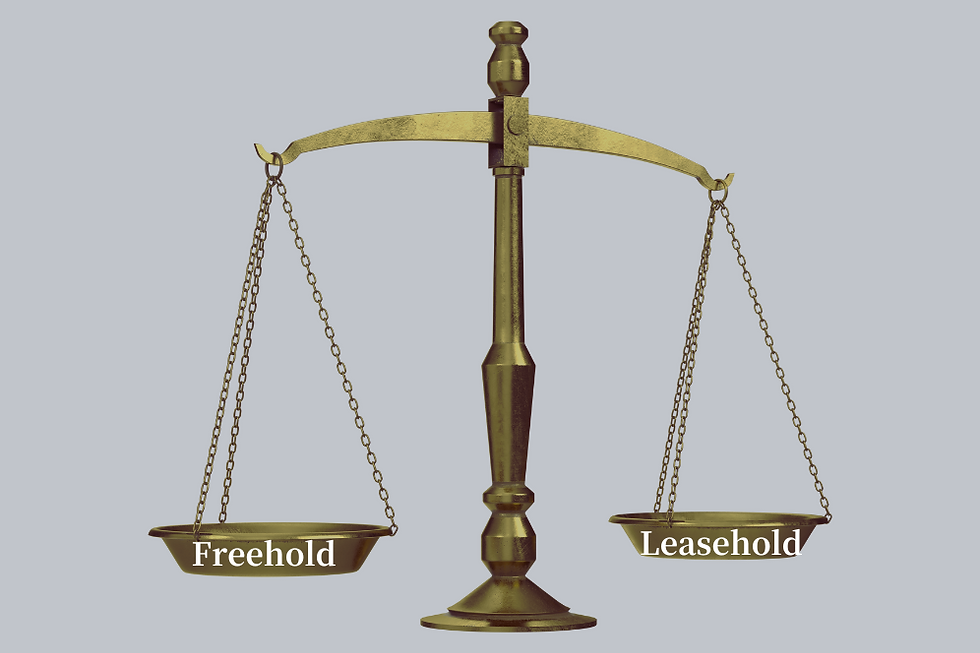Understanding Land Titles in Malaysia: Freehold vs. Leasehold
- Sean Liew

- Jan 9, 2025
- 3 min read
Investing in land is one of the most reliable ways to grow wealth in Malaysia. However, before diving into the property market, understanding the different types of land titles is crucial. The distinction between freehold and leasehold ownership significantly impacts your rights, responsibilities, and investment potential. This guide will provide a comprehensive overview of land ownership in Malaysia, helping investors make informed decisions.

Brief Overview of Land Ownership in Malaysia
Malaysia offers two main types of land ownership: freehold and leasehold. Both have unique benefits and challenges, which are essential for potential investors to grasp. Choosing the right type of land title can influence long-term returns and suitability for various development plans.
The Concept of Land Titles
What Are Land Titles?
Land titles are legal documents that establish ownership of a piece of property. They outline the rights and responsibilities of the landowner, including permissible uses and any limitations imposed by authorities.
Impact on Ownership Rights
The type of land title you hold determines the duration of ownership, restrictions on development, and resale value. Understanding these factors can protect investors from unforeseen complications.
Types of Land Ownership in Malaysia
Freehold Land
Definition:
Freehold land grants indefinite ownership to the buyer, providing permanent rights to the property.
Ownership Duration and Rights:
The owner retains full rights to the property without time restrictions, subject to compliance with local regulations.
Key Advantages of Freehold Ownership:
Permanent Ownership Providing Security:
Freehold ownership offers peace of mind, especially for investors seeking long-term stability.
Flexibility in Development:
Owners can modify or redevelop the property as needed, enhancing its value over time.
Common Misconceptions About Freehold Land:
Some believe freehold properties are entirely free of restrictions, but local zoning laws and government regulations still apply.
Leasehold Land
Definition:
Leasehold land is owned for a fixed period, typically ranging from 30 to 99 years, after which ownership reverts to the state or landowner.
Ownership Duration and Rights:
Leasehold owners have rights over the property for the lease duration but may face restrictions on development or alterations.
Key Advantages of Leasehold Ownership:
Lower Upfront Costs:
Leasehold properties are often more affordable, making them attractive to first-time investors.
Access to Prime Locations:
Leasehold land is commonly available in sought-after areas, providing opportunities in prime real estate markets.
Common Misconceptions About Leasehold Land:
A frequent misconception is that leasehold properties lose value rapidly. While depreciation occurs, properties in strategic locations can retain or even increase in value.
Comparison Between Freehold and Leasehold
Duration of Ownership:
Freehold: Indefinite ownership offers enduring security.
Leasehold: Ownership is limited to a set period, requiring renewal or forfeiture at the lease's end.
Investment Value:
Freehold: Typically maintains higher resale value due to indefinite ownership.
Leasehold: May depreciate as the lease approaches its end, although location and market demand can mitigate this.
Development Restrictions:
Freehold: Allows more flexibility for property modifications and redevelopment.
Leasehold: Subject to restrictions by the landowner or state authorities during the lease period.
Market Demand:
Freehold: Higher demand among buyers due to the perception of stability and permanence.
Leasehold: Appeals to specific buyers, often those seeking affordability or prime locations.
Implications for Investors
Long-term vs. Short-term Investment Strategies:
Freehold properties suit long-term investors aiming for stable growth and minimal risk.
Leasehold properties can be ideal for short-term gains in high-demand areas, provided the lease duration aligns with investment goals.
Risk Assessment:
Leasehold Risks:
As the lease expires, renewal costs or forfeiture can impact investment returns.
Development Regulations:
Investors must evaluate restrictions that may hinder property enhancement.
Investing in Malaysian land requires understanding the critical differences between freehold and leasehold ownership. While freehold properties offer security and higher demand, leasehold properties provide cost-effective access to prime locations. Choosing the right type depends on individual investment goals, market trends, and risk tolerance.
Before making an investment, consult property experts and conduct thorough due diligence. For more resources on land ownership and property investment in Malaysia, explore our recommended guides and connect with professionals for tailored advice.
Sean Liew
+60139996666



Comments